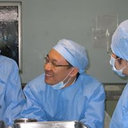Parthenolide exerts inhibitory effects on angiogenesis through the downregulation of VEGF/VEGFRs in colorectal cancer.
Parole chiave
Astratto
Parthenolide (PT) is responsible for the bioactivities of feverfew (Tanacetum parthenium). Apart from its potent anti-inflammatory effects, this compound has been reported to induce apoptosis in various cancer cells. However, little is known about its role in the process of tumor angiogenesis. In the present study, we investigated the effects and potential mechanisms of action of PT on angiogenesis in human colorectal cancer (CRC). The anti-angiogenic effects of PT were evaluated in cultured human umbilical vein endothelial cells (HUVECs) and in the human CRC cell lines, HT-29, SW620 and HCT116. PT markedly inhibited vascular cell migration and capillary-like structure formation even at a dose which had not effects on cell viability. PT also suppressed the expression of angiogenic biomarker proteins [vascular endothelial growth factor (VEGF), VEGF receptor (VEGFR)1 and VEGFR2] in both the HUVECs and CRC cells. Additionally, PT effectively inhibited tumor neovascularization in a HT-29 xenograft model. These results indicate that PT suppresses angiogenesis by reducing the expression of VEGF and its receptors and may be a viable drug candidate in anti-angiogenesis therapies for human CRC.



